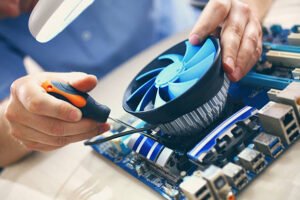How Long Will a Gaming PC Last
If you are going to construct or purchase a new gaming personal computer, one query that may cross a person’s mind at the beginning: How Long Will a Gaming PC Last? It is a question that perfectly makes sense—after all, a gaming rig is a rather expensive piece of equipment. For both players only occasionally involved in video games and players who take the gaming industry more seriously – esports, it is always crucial to find out how long your money will stay useful.

In this guide, you will learn what affects the lifespan of a gaming PC and what can be expected for the years to come, as well as how to maintain the computer’s usability instead of upgrading it constantly. Here are some of the answers to help you make informed decisions—based on real events and real knowledge.
Individuals need to have a clear understanding of the lifespan of a Gaming PC.
How Long Will a Gaming PC Last? The life expectancy of the computer will vary depending on how good the quality of the components used in the computer and the kind of activities it will be used, mostly gaming and the ability to handle future high-end games.
In general, it is possible to have a mid-range gaming PC for 4 to 6 years without having to change most of the hardware. Ultimate can extend that to 7-8 years, but you would have to lower your graphics requirements towards the later years.
Key Components That Impact Longevity
When used at its most basic, one needs to define the overall mechanical system and how each of the main components warrants a given level of aging.
1. Graphics Card (GPU)
CUDA cores are one of the most sensitive components that indicate that the hardware is outdated. AAA games of today are graphic-demanding, new technologies like ray tracing are under development.
The lifespan of a high-end GPU is around 5-7 years, during which the performance tends to decrease gradually.
It has a mid-range GPU duration of approximately 36 months before there is a sign of lag in new games.
2. Processor (CPU)
While GPUs become outdated much faster, CPUs last longer, or rather age better, or if they are multi-core and have a high clock rate.
Top-tier CPUs: Can last 6–8 years.
Entry-level CPUs: This may begin to hinder the performance of a system after 3-4 years.
3. RAM
RAM does not degrade over time but has the trait of being a constraint. What has become conventional for today’s games, is 16GB which rated as ideal. If your built includes less means the usage capacity is less, then you might subject to performance challenges earlier.
Upgradable RAM: gives the ability of increasing systems’ mean time between failure without necessarily incurring great additional expense.
4. Storage (SSD/HDD)
In this respect, it is important to note that slow or faulty storage does not necessarily affect the game, yet it may completely spoil the fun.
SSD lifespan: 5–10 years, and much faster than HDDs.
Tip: It is recommended to begin with at least 1TB of SSD space for the contemporary titles.
5. Motherboard and Power Supply
These components last longer if one has used quality brands on them. But what matters is that they should allow for future upgrades if you want the gaming PC to have a longer life cycle.
Usage Patterns Matter
Various factors make the usage of your PC extremely important How Long Will a Gaming PC Last? A user who spends two hours gaming and who does not overclock is likely to get better utilization than someone who runs a high load 12 hours a day and has poor coolants.
Customers: It is estimated that they place regular gamers in a position to use the console for roughly 5-6 years.
Laptop users or those who rely on it for gaming more than 2 hours in a day: might require upgrade in every 3 to 4 years.
How Fast Technology Evolves
It is also important to realize that a gaming PC undergoes two forms of aging – the physical variety, and the digital one. Game engines improve. Graphic demands increase. There are emergent new APIs and technologies (as DLSS, FSR, ray tracing, etc.).
In the case your PC lacks new technologies it will still run games but at very low level experience. Therefore, when asking How Long Will a Gaming PC Last, it is also essential to realize the rate of change in the gaming industry.
Upgrades Can Extend the Lifespan
One of the greatest strengths of a gaming PC lies in the fact that it is highly customizable. Replacing or upgrading one or more components, for example, graphics card, or RAM can be a way to revive an old computer. For a PC user who does not want to engage in rebuilding his/her computer continually, it is beneficial to have one that is well-built and receives upgrades at the right time.
- GPU upgrade after 4 years
- More RAM after 3 years
- Add cooling or SSDs as needed
When someone asks, How Long Will a Gaming PC Last yes however it means they are willing to make upgrades from time to time rather than replace the whole system.
Here are some of the signs that suggest that the business needs an upgrade to its customer acquisition software:
No one can tell when his gaming PC is done for or showing the first sign of failure and this is why you need to know when your gaming PC is on its last legs. It is now possible to list signs that one is getting closer to the subject or themes of a given text:
- Games stutter or crash frequently
- Initially, you cannot satisfy the minimum specifications of new releases
- It becomes noisy, and the computers start to become hot especially the receiver.
- The issue of loading times is rather critical and remains an area of concern as it takes time to load even on an SSD.
These do not necessarily mean that your PC is virtually useless—it just means that it has come to a time when it is best to upgrade than to continue enduring.
Looking at recent experiences of gamers who have ever wondered if the current gaming PC can be made to last longer or not:
- Yes! Despite this, one could extend the lifespan of a gaming PC through the following measures:
- Regular maintenance: Clean out dust every few months.
- Quality thermal paste: Keeps your CPU cooler for longer.
- Protectors: Provides extra safety from any sudden unexpected increase in the electrical current flow.
Do not over-clock frequently: It leads to a shortened lifespan of the used components.
For example, doing your pool as if it is similar to owning a car. Having changed the engine oil at the right time and practicing good usage of the car will make it to years. That applies to gaming PCs in the same way.
Conclusion: It’s All about Balance
So, How Long Will a Gaming PC Last? The real answer is – it depends on the approach you have towards it and expect from it. The performance of gaming PCs is enough for 5-6 years, and with maintenance, it is possible to extend that period.

Whether you’re skilled in multiplayer games or enjoying single-player experiences, a well-planned set of components for the gaming PC build could last for years. Thus, it is possible to get the greatest value for money by selecting high-quality components, performing regular maintenance, and updating the system occasionally according to the need for change.
Do not bother to ponder when your computer may become outdated and why this is such a bad thing to happen, learn how to have a versatile setup. Nevertheless, gaming is entertaining, so let your PC last that long and be a part of the fun.
FAQs
How Long Will a Gaming PC Last If I do this only for indie or older games?
It can provide you with 7-10 years of usage if you are not very much into playing complex games. Indie games rarely stress hardware as HD ones do; therefore, they can be run on comparatively old PCs.
Is it true that a gaming PC’s life cycle is reduced when it is used for work?
Not necessarily. Daily applications (such as web surfing, office work or attending meetings via video conferencing) will not stress your components like gaming or even video rendering will. It is advisable to just keep the cooling level decent which can then enable one to work fine.








